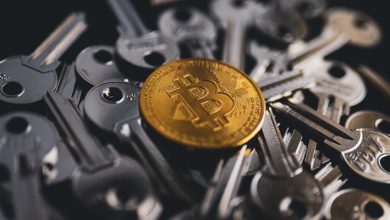How to Safely Store Your Cryptocurrencies

- Understanding the importance of secure storage for cryptocurrencies
- Choosing the right type of wallet for your digital assets
- Implementing strong password and security measures for your crypto wallet
- Backing up your wallet and private keys to prevent data loss
- Staying vigilant against phishing scams and hacking attempts
- Diversifying your storage options to minimize risks and maximize security
Understanding the importance of secure storage for cryptocurrencies
Cryptocurrency storage is a critical aspect of managing your digital assets. Understanding the importance of secure storage for your cryptocurrencies is essential to protect them from theft or loss. When it comes to storing your cryptocurrencies, there are several options available, each with its own level of security and convenience.
One of the most secure ways to store your cryptocurrencies is by using a hardware wallet. Hardware wallets are physical devices that store your private keys offline, making them less vulnerable to hacking or cyber attacks. By keeping your private keys offline, you can significantly reduce the risk of unauthorized access to your funds.
Another option for storing your cryptocurrencies is a paper wallet. A paper wallet is simply a physical document that contains your public and private keys. While paper wallets are secure from online threats, they can be easily lost, damaged, or stolen if not stored properly.
Online wallets, also known as hot wallets, are another popular option for storing cryptocurrencies. Online wallets are convenient to use and can be accessed from anywhere with an internet connection. However, they are more vulnerable to hacking and cyber attacks compared to hardware wallets or paper wallets.
Regardless of which storage option you choose, it is crucial to take additional security measures to protect your cryptocurrencies. This includes enabling two-factor authentication, using strong passwords, and keeping your private keys secure. By understanding the importance of secure storage for your cryptocurrencies and taking the necessary precautions, you can safeguard your digital assets from potential threats.
Choosing the right type of wallet for your digital assets
When it comes to safeguarding your cryptocurrencies, choosing the right type of wallet is crucial. There are several options available, each with its own set of pros and cons.
One popular choice is a hardware wallet, which is a physical device that stores your digital assets offline. This provides an extra layer of security compared to online wallets, as it is not vulnerable to hacking. However, hardware wallets can be more expensive and less convenient for frequent transactions.
Another option is a software wallet, which is a digital application that can be accessed on your computer or mobile device. Software wallets are typically free and easy to use, making them a convenient choice for many users. However, they are more susceptible to cyber attacks than hardware wallets.
A third option is a paper wallet, which involves printing out your private keys and storing them in a secure place. Paper wallets are immune to hacking since they are not connected to the internet. However, they can be easily lost or damaged, putting your assets at risk.
Ultimately, the best type of wallet for you will depend on your individual needs and preferences. It is important to weigh the security, convenience, and cost factors of each option before making a decision. Remember to do thorough research and choose a reputable provider to ensure the safety of your digital assets.
Implementing strong password and security measures for your crypto wallet
When it comes to securing your cryptocurrencies, implementing strong password and security measures for your crypto wallet is crucial. By taking the necessary steps to protect your assets, you can minimize the risk of unauthorized access and potential theft.
One of the first things you should do is create a complex password for your crypto wallet. Avoid using simple or easily guessable passwords, such as “123456” or “password.” Instead, opt for a combination of uppercase and lowercase letters, numbers, and special characters. This will make it much harder for hackers to crack your password.
In addition to creating a strong password, consider enabling two-factor authentication (2FA) for an extra layer of security. With 2FA, you will need to provide a second form of verification, such as a code sent to your phone, in addition to your password. This makes it even more difficult for unauthorized users to gain access to your wallet.
Furthermore, be cautious about where and how you store your password and other sensitive information related to your crypto wallet. Avoid writing it down or saving it in easily accessible locations, such as your email or cloud storage. Instead, consider using a password manager to securely store and manage your login credentials.
Backing up your wallet and private keys to prevent data loss
Backing up your wallet and private keys is crucial in preventing the loss of your valuable cryptocurrencies. By creating backups, you can ensure that you will be able to access your funds even if your device is lost, stolen, or damaged. There are several methods you can use to back up your wallet and private keys:
1. **Paper Wallet**: One of the most secure ways to back up your private keys is by creating a paper wallet. This involves printing out your private keys and storing them in a secure location, such as a safe deposit box. This method is offline, making it less vulnerable to hacking.
2. **Hardware Wallet**: Another popular option for backing up your private keys is by using a hardware wallet. These devices store your private keys offline, protecting them from online threats. Hardware wallets are considered one of the most secure ways to store cryptocurrencies.
3. **Cloud Storage**: You can also choose to back up your wallet and private keys using cloud storage services. However, this method comes with its own risks, such as hacking and data breaches. Make sure to encrypt your backups and use strong passwords to protect your information.
4. **Multiple Locations**: To further enhance the security of your backups, consider storing copies of your wallet and private keys in multiple locations. This way, if one backup is lost or compromised, you will still have access to your funds.
By taking the time to back up your wallet and private keys, you can safeguard your cryptocurrencies against data loss and ensure that you will always be able to access your funds when needed. Remember to regularly update your backups and test their validity to maintain the security of your digital assets.
Staying vigilant against phishing scams and hacking attempts
When storing your cryptocurrencies, it is crucial to stay vigilant against phishing scams and hacking attempts. Hackers are constantly looking for opportunities to steal your digital assets, so it is essential to take proactive measures to protect your investments.
One of the most common ways hackers try to gain access to your cryptocurrencies is through phishing scams. These scams often involve fraudulent emails or websites that trick you into giving away your private keys or login credentials. To avoid falling victim to these scams, never click on suspicious links or provide sensitive information to unknown sources.
Another threat to your cryptocurrencies is hacking attempts. Hackers use sophisticated techniques to breach security systems and access digital wallets. To protect yourself from these attacks, make sure to use a secure and encrypted wallet, enable two-factor authentication, and regularly update your software to patch any vulnerabilities.
By staying informed about the latest cybersecurity threats and taking proactive measures to secure your cryptocurrencies, you can minimize the risk of falling victim to phishing scams and hacking attempts. Remember to always be cautious and skeptical when it comes to protecting your digital assets.
Diversifying your storage options to minimize risks and maximize security
One way to enhance the security of your cryptocurrency storage is by diversifying your storage options. By spreading your funds across multiple wallets and exchanges, you reduce the risk of losing all your assets in case one storage solution is compromised. Here are some ways to diversify your storage options:
- Use a combination of hot and cold wallets: Hot wallets are connected to the internet and are convenient for frequent transactions, while cold wallets are offline and provide an extra layer of security.
- Store your cryptocurrencies on different exchanges: Avoid keeping all your assets on a single exchange, as this can expose you to higher risks in case of a security breach.
- Consider using hardware wallets: Hardware wallets are physical devices that store your private keys offline, making them less vulnerable to hacking attempts.
- Utilize multi-signature wallets: Multi-signature wallets require multiple private keys to authorize a transaction, adding an extra level of protection to your funds.
By diversifying your storage options, you can minimize the risks associated with storing cryptocurrencies and maximize the security of your digital assets. Remember to regularly review and update your storage strategy to adapt to the evolving landscape of cryptocurrency security.



